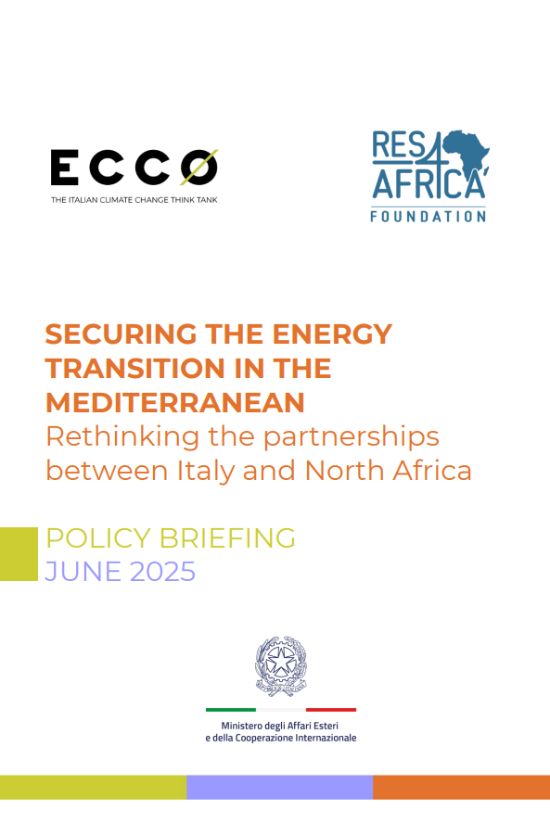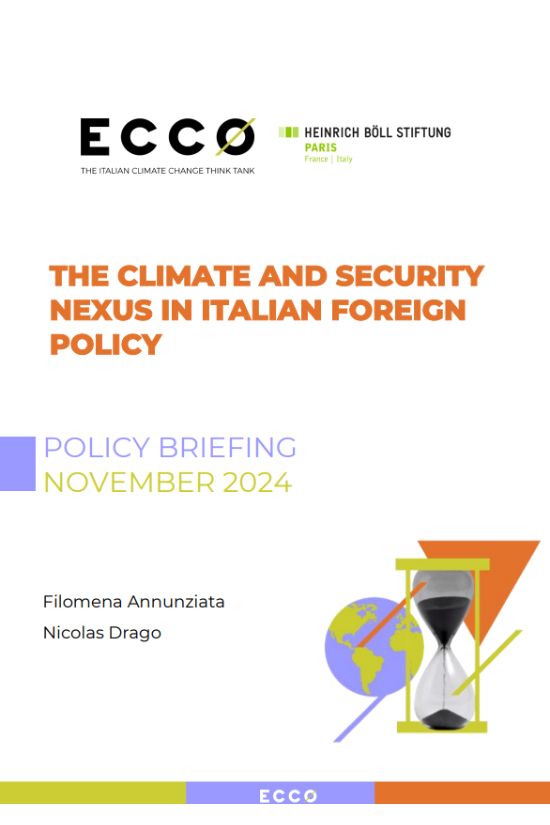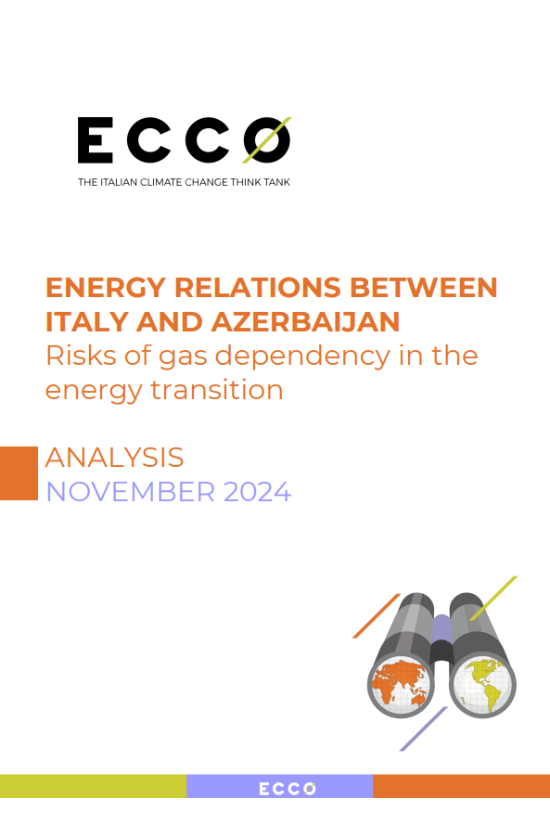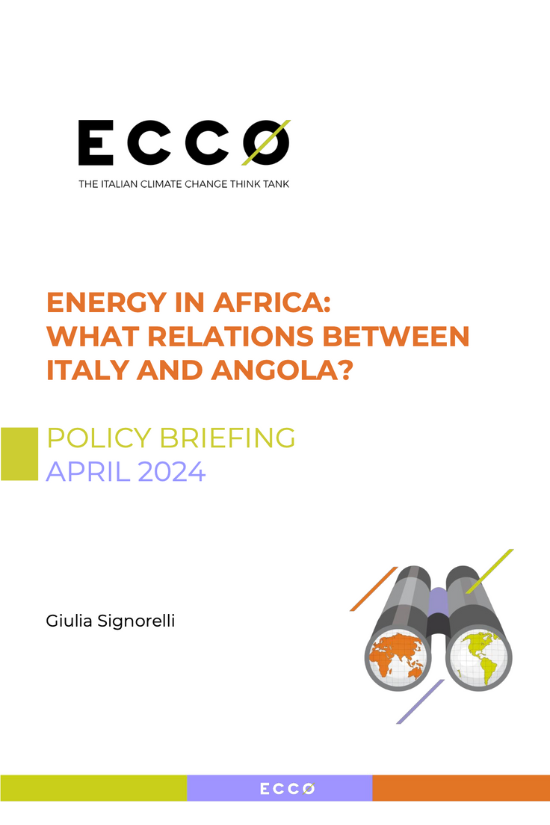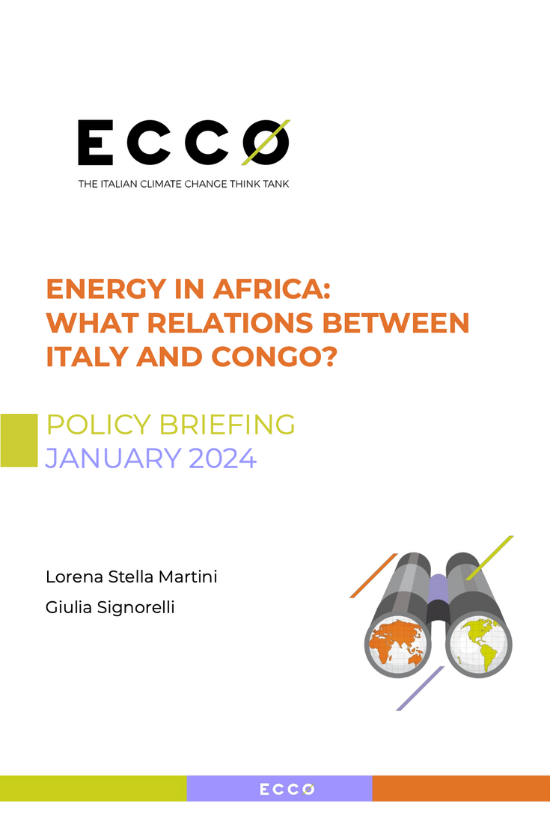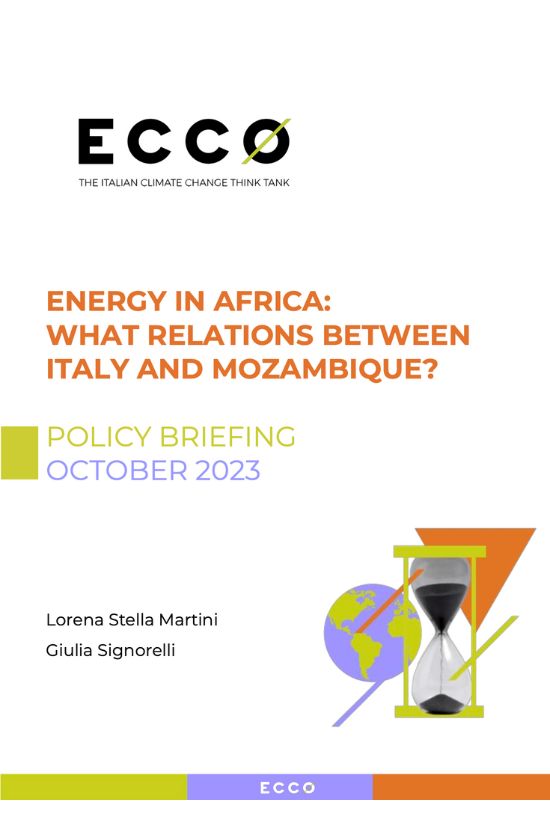Publications
Search
Filters
Authors
/ Alexandra Scott
/ Andrea Ghianda
/ Annalisa Perteghella
/ Beatrice Moro
/ Carolina Bedocchi
/ Caterina Molinari
/ Chiara Di Mambro
/ Chiara Mariotti
/ Chloe Pagliaro
/ Costanza Scano
/ Davide Panzeri
/ ECCO think thank
/ Eleonora Cogo
/ Federico Tassan-Viol
/ Filomena Annunziata
/ Francesca Andreolli
/ Francesca Bellisai
/ Gabriele Cassetti
/ Giovanni D'Amico
/ Giulia Colafrancesco
/ Giulia Giordano
/ Giulia Novati
/ Giulia Signorelli
/ Ilaria Mazzocco
/ Lorena Stella Martini
/ Luca Bergamaschi
/ Luca Iacoboni
/ Mario Noera
/ Marta Lovisolo
/ Massimiliano Bienati
/ Matteo Leonardi
/ Matteo Viola
/ Michele Governatori
/ Nicolas Drago
This policy brief explores the evolving nexus between energy security and energy transition within Italy’s foreign policy towards North Africa, providing recommendations on how Italy can play a leading role – including at a European level – in promoting the energy transition in the Mediterranean region through its relations with North African countries, both at a bilateral and multilateral level.
The Sixth Assessment Report of the Intergovernmental Panel on Climate Change (IPCC) describes the Mediterranean as a climate change hotspot. Despite relatively low levels of greenhouse gas (GHG) emissions, the effects of global warming are felt more rapidly in this region than anywhere else in the world, with temperatures expected to rise by 20% above the global average.
Azerbaijan COP29’s Presidency has a key role to play in relaunching the ambition of the commitments signed at COP28 in Dubai, including tripling renewable energy capacity and doubling energy efficiency by 2030, but above all, it needs to be decisive in giving a concrete follow-up to the decision to transition away from fossil fuels in energy systems in a fair, orderly and equitable manner. However, the priorities on the agenda outlined by Baku do not include elements to advance the phase out of fossil fuels.
The Mattei Plan offers an opportunity to redefine a new partnership with Angola. However, a partnership based on the exploitation of fossil fuels is not only not economically viable in view of a declining Italian and European demand for oil and gas according to all scenarios, but it is also on a collision course with market trends.
An Italy-Congo partnership based on the exploitation of fossil fuels is not the best investment for the country’s economy, as it fuels a vicious cycle of debt, poverty, inequality and corruption and lack of diversification. For Italy, such partnership is not only unprofitable in the face of a declining gas demand under all scenarios, but it would also collide with market new interests. Insisting on gas in the Italy-Congo relationship increasingly ties Italy’s foreign policy to gas policy, and away from its climate commitments.
The revival of relations between Italy and African countries needs to be contextualized within a framework of renewed interest in the African continent. In this framework, the Meloni government is working on a new strategic project for Africa, known as “Mattei Plan”, which aims at establishing equal and mutually beneficial relations with African partners, in a “non-predatory” context. Against this backdrop, Mozambique represents an extremely relevant partner for Rome, drawing on solid relations at both a governmental and civil society level.
This policy brief explores the evolving nexus between energy security and energy transition within Italy’s foreign policy towards North Africa, providing recommendations on how Italy can play a leading role – including at a European level – in promoting the energy transition in the Mediterranean region through its relations with North African countries, both at a bilateral and multilateral level.
The Sixth Assessment Report of the Intergovernmental Panel on Climate Change (IPCC) describes the Mediterranean as a climate change hotspot. Despite relatively low levels of greenhouse gas (GHG) emissions, the effects of global warming are felt more rapidly in this region than anywhere else in the world, with temperatures expected to rise by 20% above the global average.
Azerbaijan COP29’s Presidency has a key role to play in relaunching the ambition of the commitments signed at COP28 in Dubai, including tripling renewable energy capacity and doubling energy efficiency by 2030, but above all, it needs to be decisive in giving a concrete follow-up to the decision to transition away from fossil fuels in energy systems in a fair, orderly and equitable manner. However, the priorities on the agenda outlined by Baku do not include elements to advance the phase out of fossil fuels.
The Mattei Plan offers an opportunity to redefine a new partnership with Angola. However, a partnership based on the exploitation of fossil fuels is not only not economically viable in view of a declining Italian and European demand for oil and gas according to all scenarios, but it is also on a collision course with market trends.
An Italy-Congo partnership based on the exploitation of fossil fuels is not the best investment for the country’s economy, as it fuels a vicious cycle of debt, poverty, inequality and corruption and lack of diversification. For Italy, such partnership is not only unprofitable in the face of a declining gas demand under all scenarios, but it would also collide with market new interests. Insisting on gas in the Italy-Congo relationship increasingly ties Italy’s foreign policy to gas policy, and away from its climate commitments.
The revival of relations between Italy and African countries needs to be contextualized within a framework of renewed interest in the African continent. In this framework, the Meloni government is working on a new strategic project for Africa, known as “Mattei Plan”, which aims at establishing equal and mutually beneficial relations with African partners, in a “non-predatory” context. Against this backdrop, Mozambique represents an extremely relevant partner for Rome, drawing on solid relations at both a governmental and civil society level.
